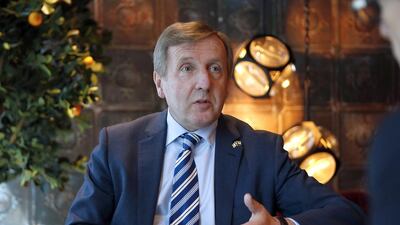Irish farmers are often the brunt of jibes from their urban-dwelling countrymen and women for complaining from a position of relative comfort.
But the withdrawal of the United Kingdom from the European Union represents a threat that even the most sceptical of townies would not dispute.
The UK is the destination of about 40 per cent of Irish agri-food products and the prospect of tariffs, hard borders and a weaker sterling could devastate that trade – not just across the Irish Sea but on the island itself across what is now a soft border.
Brexit has triggered renewed urgency for Ireland to develop new export markets beyond Britain. The Irish agriculture minister Michael Creed this week visited the UAE and Saudi Arabia to seek better access as Irish farmers hope for the best and prepare for the worst post-Brexit.
“That’s not to say we are walking away from the UK market,” said Mr Creed, who is also a former dairy farmer. “But we are conscious in the context of Brexit that it is a threat to our position – therefore new market opportunities are vitally important.”
The minister emerged from his visit to Riyadh this week with an enhanced export agreement that will allow Ireland to send cooked and processed meat products to the kingdom.
Ireland exported food and drink worth €385 million (Dh1.49 billion) last year to the Middle East, a 40 per cent increase since 2012. The Gulf states account for about 70 per cent of that, or €280m.
But that represents just a fraction of the estimated €4.1bn in food and drink exports that head to Britain from the country.
Ireland wants the post trading relationship with Britain to be as close as possible to the status quo. It also wants its neighbour to keep existing EU standards in place to prevent being priced out by lower-cost producers who may not meet the same regulatory measures.
“What we understand is that on the day of departure they will absorb into their own legislative framework all of the existing arrangements in terms of veterinary standards and certification, but then they are free to unpick those standards, raise them or drop them over a period of time as they see fit.”
That is one worry for Ireland. Another is the possibility that trade would default to World Trade Organisation (WTO) rules.
If Britain were to revert to standard WTO rules in its agricultural trade post-Brexit it would be “a disaster”, according to Mr Creed.
The influx of Western expatriates into the Arabian Gulf over the past decade and the huge growth in the hospitality sector has created a booming market for global food exporters.
At the annual Gulfood exhibition being hosted in Dubai this week exporters and ministers from other major agricultural exporters including New Zealand, Australia and Britain itself are engaged in a marketing bunfight. All are promoting the sustainability and traceability of their products in what is becoming an increasingly crowded market. But for Ireland, boosting exports to the region is especially important.
“We are unique in terms of the remaining 27 states in terms of our exposure to the UK. Others would have some trade relationship – the Danes and Dutch would have some similar concerns – but none are as exposed to the UK market as we are.”
Mr Creed concedes that Ireland is “somewhat confused” by Britain’s trading wish list post-Brexit.
“Our real concern is that they want access to our market but they also want to be able to negotiate their own deals with other trading blocs, which could undermine our market in the UK.”
If anticipating what Ireland’s future agricultural relationship with Britain will look like is difficult, predicting how trade between north and south in Ireland will work is an even bigger challenge.
While Northern Ireland remains part of the United Kingdom, agriculture is effectively fully integrated north and south.
Much of the milk produced in Northern Ireland is processed in the Republic of Ireland. Cattle move back and forth across an invisible border.
“That would be thrown into real jeopardy if you had a hard border. It would be psychologically a huge scar,” said Mr Creed. “That could put you on a slippery slope back to a place that nobody wants to go. So the stakes are particularly high and complex in Northern Ireland.”
Irish farmers, north and south, for once really do have something to complain about.
scronin@thenational.ae
Follow The National's Business section on Twitter

